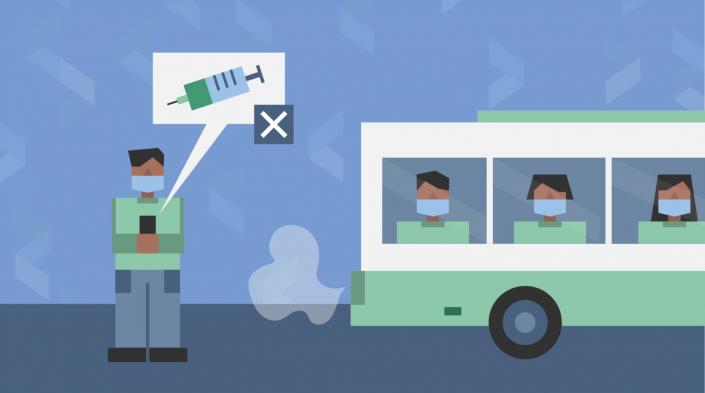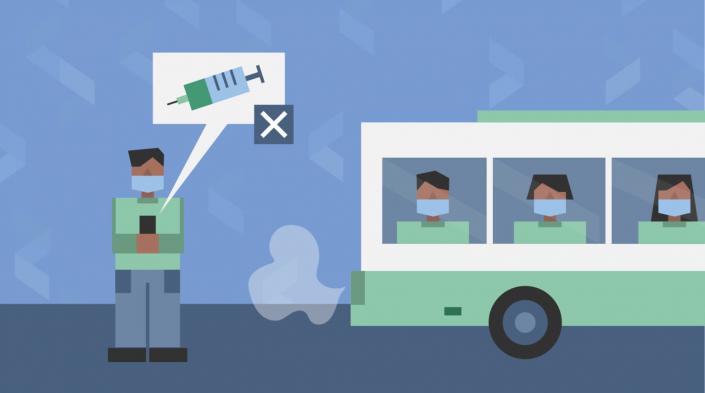[ad_1]

By EngageMedia guest writer
Published on
Page last updated on
This piece was originally published by APC member organisation EngageMedia.
This article is part of Pandemic of Control, a series of articles that aims to further public discourse on the rise of digital authoritarianism in the Asia-Pacific amid COVID-19. Pandemic of Control is an initiative by EngageMedia, in partnership with CommonEdge. Read more about the series here.
Since the COVID-19 vaccine rollout began in January 2021, people in Indonesia have been clamouring to get vaccinated. Widespread media coverage on rising cases, government campaigns touting the efficacy of vaccines to increase immunity, and fear of getting sick drove many to queue at their local health centres. As of April 2022, 59 percent of its 270 million population have been vaccinated.
Immunocompromised people like me had concerns about the safety of vaccines due to our medical conditions, and so many of us opted to wait and take extra precautions (such as avoiding crowds) to ensure our safety. In July 2021, the Indonesian government launched the PeduliLindungi application, intended as a pandemic management tool for implementing health protocols, contact tracing, and monitoring vaccination status. Since its launch, PeduliLindungi – and one’s vaccination status as reflected on the app – has become mandatory for free movement in public spaces. People have to install the app on their smartphones to be able to scan QR codes at facilities such as banks, shops, and health centres before being allowed entry.
This requirement to be part of the PeduliLindungi system and show my vaccination status to access basic services created major hurdles in my daily routines. My freedom of movement became restricted, as the government relied on apps like PeduliLindungi to control the pandemic – this, despite concerns over data privacy and whether or not such digital tools are an effective pandemic management tool in the first place. (Learn more about PeduliLindungi in another article from the Pandemic of Control series.)
Restrictions to free movement
Initially, I did not want to get vaccinated because of my immunocompromised status. Ten years ago, I was diagnosed with rheumatoid arthritis, an autoimmune disease in which my immune system attacks healthy cells in my body by mistake and causes inflammation. Because of my condition, I have been selective in taking medication, including vaccines.
Problems began to arise when various institutions started to require proof of vaccination as a condition to enter public spaces such as offices, banks, and malls. In early 2022, Luhut Binsar Panjaitan, Indonesian Coordinating Minister for Maritime Affairs and Investment, made a statement that only people who were vaccinated twice could enter public facilities. This would be reflected in the PeduliLindungi app, which shows people’s health status through four colour categories:
-
Black: User is positive for COVID-19 or has a history of close contact with COVID-19 patients
-
Red: User is not vaccinated or has been exposed to a COVID-19 case; not allowed to enter public areas
-
Yellow: User has received a first dose of the vaccine; allowed to enter public places after further verification and in compliance with strict health protocols
-
Green: User is fully vaccinated and allowed to enter public places
Because I was not vaccinated, I had difficulties moving around as my job required travelling out of town. To use public transportation, I needed a doctor’s note for each trip. I could also secure a certificate about my autoimmune disease from an internal medicine doctor, but it would require me to take several tests and go to a hospital more than 20 kilometres away from my house in Yogyakarta. Additionally, unvaccinated people like me were required to take RT-PCR tests, which could only be done at major laboratories and hospitals (quite a distance from my home), with results released in a couple of days.
An ineffective pandemic management tool?
Governments around the world have resorted to apps like PeduliLindungi to restrict freedom of movement for the unvaccinated as part of their COVID-19 mitigation response. Proponents argue that mandating the use of such tools drives up vaccination rates (this, despite legitimate concerns from immunocompromised people like me). But sceptics point out that not only do these tools present a host of scientific, ethical, and legal issues that may only exacerbate inequalities, the use of these digital platforms also poses risks to privacy and digital security. The primary purpose of the passports was to mitigate infection; unfortunately it has long been clear that the vaccine and the passports are ineffective in this regard.
PeduliLindungi, for instance, has a massive database – over 50 million people have already downloaded the app. But questions remain on whether the information kept by the system is secure. There are also concerns over the app’s interconnectivity with other third-party applications and possible data breaches that may arise from it, as well as PeduliLindungi’s no-liability clause for “violations or unauthorised access”.
These issues call into question whether using apps like PeduliLindungi – with its data security issues and potential to reinforce discriminatory practices by restricting free movement – is the appropriate response to the primary purpose of reducing COVID-19 transmission.
Need for due diligence and scrutiny
I had to wait until there was a safer vaccine, but I finally chose to be vaccinated because of these troubles on travelling and going about with daily activities. Ideally, I should have gone to a doctor and undergone a series of tests before getting vaccinated. But because my house was far away from the city, I did not do that.
There were others like me who took such risks. But for many people, the cost of going to a doctor can be prohibitive. In Yogyakarta, for instance, the minimum wage per month is less than 2,000,000 rupiah (approximately 138 USD), and tests to determine if an immunocompromised person can safely take the vaccine can cost 1,000,000 rupiah (around 69 USD).
Amid legitimate concerns over the health impact of vaccines in immunocompromised people, people like me have chosen to take the vaccine and have the PeduliLindungi app allow us more freedom of movement in our daily routines. While certain concessions may be made to safeguard public health, mandating the use of tools like PeduliLindungi should be closely studied instead of hastily implemented, to ensure that authorities adopt solutions that work effectively to curb transmission while protecting against using digital tools that facilitate social exclusion and the curtailment of digital and human rights.
The writer’s identity has been withheld at their request.
[ad_2]




